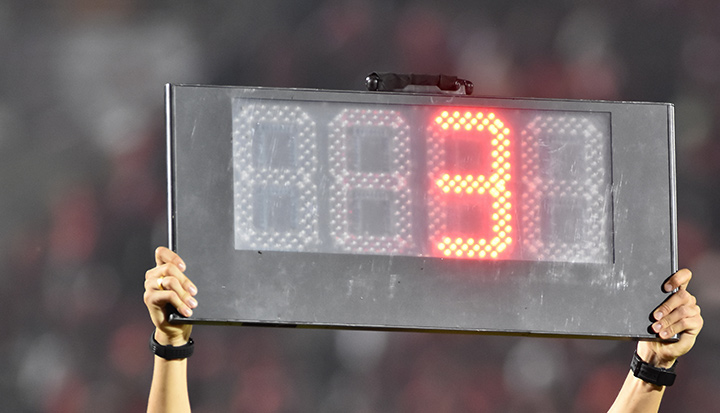Definition of Injury Time / Stoppage Time
BeGambleAware
Please Gamble Responsibly

Tools
Recent Articles
Old Hoss Radbourn And His Unbreakable Single-Season Win Record
The Time Walter Johnson Tossed a 15-Inning Shutout on Opening Day
Toby Harrah's Very Long and Boring Day in 1976
Rick Wise: The Pitcher Who Tossed a No-Hitter and Hit Two Home Runs - In The Same Game
The Time Wayne Gretzky Put Up 13 Points - In Two Games
The Time The Montreal Canadiens Left The Stanley Cup on the Side of the Road
Patrick Sieloff - Two Goals in Two Career NHL Games With Two Different Teams
Education
How To Bet on the Cheltenham Festival
Top Horse Racing Betting Sites
Curling Betting: Where To Bet on Curling
Betting Odds Explained - A Guide to Understanding Odds
A Review of The Best Online Sports Betting Company (In Our Opinion)
How Do Decimal Odds Work in Sports Betting?
Argentina La Liga de Básquet (LLA) Betting
Euroleague Betting 2024 - Where To Bet on Euroleague
Basketball Betting Sites - Best Real Money NBA Online Sportsbooks
International Content
Apuestas en la Liga Mexicana de Béisbol - ¿Dónde Apostar en la LMB?
Apuestas en la Liga Nacional de Básquetbol de Chile
Apuestas en la Primera División de Chile: ¿Dónde Apostar en la Liga Principal de Chile?
Cómo Apostar en Bet365: Guía para Principiantes
Parier sur la NFL : Où Pariez sur la NFL
Wedden op de UEFA Champions League - Hoe te wedden op de Champions League
Parier sur les Canadiens de Montréal : Où parier sur les Canadiens
Cómo Apostar en el Baloncesto Profesional Colombiano
Cómo Apostar en la Liga Profesional de Primera División en Uruguay
Apuesta en LNBP: Guía del Apostador para la Liga de Baloncesto Premier de México
Copa Libertadores: Odds de Apuestas - ¿Dónde Apostar en Línea?
Apuestas NBA 2024: Dónde apostar a la NBA
Apuestas deportivas en línea 2024
Una reseña de la mejor compañía de apuestas deportivas en línea (en nuestra opinión)
Article Archive
Baseball (127)
Basketball (276)
Boxing (148)
Football (849)
Golf (32)
MMA (298)
Other (780)
Soccer (2232)
Tennis (97)

